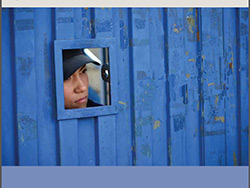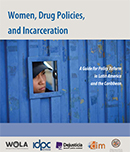- English
- Español
Women, drugs and human rights in the Americas
Claims by the media, paired with the scarce data available, suggest that in recent years, the participation of women in the international drug industry has increased significantly. Nevertheless, while this participation is visible in the news, it has been largely absent from the research and other activities of most governmental and inter-governmental bodies in the Americas.
In general, we know relatively little about the people that participate in the drug industry – be they men or women. As usually happens in other areas, however, we understand even less about women’s participation in this world and we tend to interpret it through gendered stereotypes that, on the one hand, complicate an adequate understanding of the social, economic and cultural factors that determine this participation and, on the other hand, assign stigmatized roles to women that do participate (Anitua, G, & V. Picco, 2012)
Preliminary research conducted by the Inter-American Commission of Women (CIM) of the OAS indicates that in many countries, the majority of women denied liberty are fulfilling sentences related to the drug industry: Argentina: 68.2%, Colombia: 44% in 2009, Costa Rica: 70 %, Dominican Republic: 359 women (2004–2006) charged with drug trafficking, Ecuador: 80% in El Inca (the country’s largest women’s prison), Mexico: 48 % (compared to 15% of men), and Peru: 66.38% (2006).
A report profiles women participating in the drug industry as young, poor, illiterate or with little schooling, single mothers, and their children’s principle caretaker. In most cases, these women do not have a prominent role in drug trafficking networks and are concentrated at the lower and least secure levels.
The CIM, in collaboration with the CICAD and in the context of the 43rd session of the OAS General Assembly, organized a side-event on the gender and human rights dimensions of the world of illicit drugs in the Americas:
For more information, download the final report from the round-table discussion
A Joint proyect to promote more humane and effective policies
 The
Washington Office on Latin America (WOLA), the International
Drug Policy Consortium (IDPC), Dejusticia, in
collaboration with the CIM and other
agencies, have been working on a joint project and have just launched a newWebpage with
research on the subject and photo
essays that show the human and social cost of current drug policy in the
Americas. The goal of the joint project is to provide updated research and
analyses on the incorporation of a gender-based approach to drug policies and
policy reform options. The photo
essays initiative seeks to show the human cost of these policies for women
in Latin America. The project includes experts from across the hemishere:
Argentina, Brazil, Chile, Colombia, Costa Rica, Ecuador, the United States,
México, Puerto Rico, the United Kingdom and Uruguay
The
Washington Office on Latin America (WOLA), the International
Drug Policy Consortium (IDPC), Dejusticia, in
collaboration with the CIM and other
agencies, have been working on a joint project and have just launched a newWebpage with
research on the subject and photo
essays that show the human and social cost of current drug policy in the
Americas. The goal of the joint project is to provide updated research and
analyses on the incorporation of a gender-based approach to drug policies and
policy reform options. The photo
essays initiative seeks to show the human cost of these policies for women
in Latin America. The project includes experts from across the hemishere:
Argentina, Brazil, Chile, Colombia, Costa Rica, Ecuador, the United States,
México, Puerto Rico, the United Kingdom and Uruguay
Women, Drug Policies and Encarceration
 The
CIM, the
Washington Office on Latin America (WOLA), the International
Drug Policy Consortium (IDPC) and Dejusticia developed a new
publication: “Women, Drug Policies and Incarceration: A Guide for Policy Reform
in Latin America and the Caribbean”. The guide—the first of its kind—offers a
roadmap for officials and reform advocates for implementing policy changes that
could benefit the thousands of women incarcerated on drug charges across the
Americas.
The
CIM, the
Washington Office on Latin America (WOLA), the International
Drug Policy Consortium (IDPC) and Dejusticia developed a new
publication: “Women, Drug Policies and Incarceration: A Guide for Policy Reform
in Latin America and the Caribbean”. The guide—the first of its kind—offers a
roadmap for officials and reform advocates for implementing policy changes that
could benefit the thousands of women incarcerated on drug charges across the
Americas.
The Guide will be presented on February 2nd, at 10:00 am in the OAS Hall of
Americas.
Agenda in English
Agenda in Spanish
Register here.



